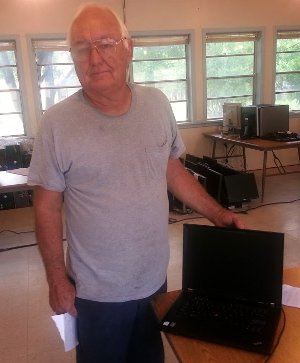Anomalies.
That’s what we are. We, as in those 50 years of age or more who not only know how to use a computer, but who make them do our bidding. Those of us who can upgrade to the latest kernel, edit photos in GIMP, use Audacity to edit sound files, or who think nothing of burning an ISO and creating a USB device that has our entire desktop system ready to carry in our pockets.
 Referring to us as anomolies in this sense isn’t hyperbole or overstatement. I see it almost every day. I am in a unique position, able to work with at least two generations of computer users:
Referring to us as anomolies in this sense isn’t hyperbole or overstatement. I see it almost every day. I am in a unique position, able to work with at least two generations of computer users:
- The generation who will put the first footprint on Mars and cure diabetes.
- The generation who cannot understand the difference between a right and a left mouse click.
I am going to be more honest with you than I should, and it’s probably not in my best interest. There was a time when I hit the wall. I could no longer sit with someone, holding their hand while they struggle to understand the simplest computer tasks.
I’m speaking of those who don’t know how to use a mouse correctly; senior folk who come into our HeliOS Project classroom to get one-on-one assistance with basic computer skills. They grasp the mouse with fingertips only, while slowly and haltingly trying to push the cursor to its target. They do so timidly and with guarded purpose, as if a wrong move or gesture will result in thermonuclear holocaust, focused so intently on this simple task that they become oblivious of their surroundings.
I wish I could say this is exaggeration. Sadly, it’s not.
Eventually it would come to the point where I simply could not do it any longer. Yeah…that’s wrong of me. I know it is.

Then Jesse comes along and gives me an attitude adjustment, without really meaning to do it.
Jesse’s retired and has lived here in Taylor, Texas his entire life. In his early 80’s, he’s active in the community and volunteers for just about every helping opportunity that comes along, from unloading a truck bringing food to our local food pantry to taking it upon himself to pick up trash in the park. He’s the epitome of the good citizen and a good man.
He came through my door a few weeks ago, seeking to purchase a used laptop computer. Someone had told him about our work and he made it a point to stop by. Several things brought him through our doors.
His kids and grandkids are located all over the U.S. and the only way he knows to communicate with them is via his home phone, a deep black corded circa 1960s cradle phone, which he’s used since the time when in-town calls were made by dialing a four digit number and people could eavesdrop on party line connections. He doesn’t trust cordless phones, and trying to talk him into getting a cell phone will evoke a twenty minute rant on the FBI, CIA and Homeland Security listening in on everything we do.
His biggest motivation for getting a laptop, however, is that he’s going back to school. He grew up in an era when young people often had to make a decision on whether to stay on the farm and help the family survive or go to school. The oldest of seven siblings, he stayed at home, allowing his brothers and sisters to go to college. Now he’s decided to do what he failed to do decades before. Jesse wants to earn his GED.
In his day, having a high school education didn’t mean as much as it does today. Fact is, these days those without a four year college degree will find many employment doors closed to them. But Jesse found a 32 year career with the railroad and did well even without a high school education. Now, however, he has grandkids who look up to him. How can he expound on the importance of education when he himself hadn’t completed even the first leg of an education?
I didn’t sell Jesse a laptop. He is, by all measure, a student. And that’s what we do. We supply computers to financially disadvantaged students. He was given one of our many T-61 dual core laptops, which were the workhorse of their era.
But then there was that nagging little problem I mentioned earlier: He had to learn how to use it.
I’m not going to go into detail here. I will tell you, however, that there was no sense of dread when I sat next to him for his first lesson. No tight stomach and dry mouth. No impending headache waiting in the wings. Not even a thought of giving him website URLs to work from and walking away.
I sit next to Jesse for one to two hours, three evenings a week. We meet either at the shop or my house. He’s doing surpisingly well. He now knows how to use the trackpad or the wireless mouse and he hasn’t come close to triggering nuclear winter. He’s doing well. He’s setting an example for his grandkids.
And he’s teaching me how to be a better teacher. That’s what counts. And you know what? I’m thinking of calling those three dozen people on our waiting list for classroom help on how to use a computer.
To be honest with you, it’s them who will teach me. Teach me about the hell of Chosin Reservoir during the Korean War. About working on Eisenhower’s super highways that eventually spanned the United States, or setting a work ethic example for generations to come. And the best part of it…
They aren’t charging me a dime.
You can help FOSS Force grow our coverage by making a contribution during our Pledge Drive. If you enjoyed this article, please help us by making a contribution. Get all of the details on our Indiegogo campaign page.
Ken Starks is the founder of the Helios Project and Reglue, which for 20 years provided refurbished older computers running Linux to disadvantaged school kids, as well as providing digital help for senior citizens, in the Austin, Texas area. He was a columnist for FOSS Force from 2013-2016, and remains part of our family. Follow him on Twitter: @Reglue






Great uplifting piece again from Ken. Nothing more to add really 🙂
My dad has taught a few classes, and in a couple, he has taught kids and given them the lessons to teach adults. One thing out of all the classes that seemed to help with all the mouse lessons (has been on Windows machines for years, maybe some OS/2 machines back in the day) was having them play solitare. That seems to be the quickest way they learn the mouse.
Why does the CAPTCHA, always come back with wrong CAPTCHA, even though it matches, after reading the article? Is there a timeout?
@Randal Sometimes there are ghosts in the machine. 🙂
Ah, the ThinkPad T61 – workhorse for a generation. Glad to see that they’re still going strong. Nice article, Ken.
I’m not a good teacher but I love helping people with Linux, especially senior citizens and I’m a fan of anyone who recognizes the importance of education.
Randal, yes there has to be a time out for the CAPTCHA to work correctly. Unfortunately, that makes it so the first CAPTCHA is always worthless by the time you’ve read and commented on the article.
I like reading grand daddy stories, thanks .
Nice post. On the generation thing . . . I sometimes think it’s exaggerated. I mean, yes, lots of people my age and older are pretty tech-ignorant. But lots of kids are too. They’re comfortable with technology, you won’t find any unable to use a mouse or do basic functions with a smartphone.
But most of them don’t really know how to make computers “do their bidding” as you say. And even ones who do, lack a certain perspective. Their knowledge is often pretty superficial. They can do what they do but they don’t really know why they’re doing it.
Our generation is kind of uniquely privileged. Those of us who got into computers young, even if like me we never became programmers or anything, got to see the layers of interface get built up. From a bare-bones TRS-80 where if you wanted a program to happen you typed it in, in BASIC, to machines running various flavours of DOS, to when Windows was barely obscuring the DOS underneath, all the way to now where half the stuff happens in the browser let alone the WIMP desktop–we know what’s underneath there, we have concepts like folder hierarchy built into our guts.
The kids came along and all the layers were already there, abstractions all over the place so they don’t have to worry about where folders are in relation to each other or what’s underneath all the pretty pictures. A lot of stuff is hidden from them and they have no obvious cues to its existence. It’s easy for them to go and do chat, but it’s hard for them to get that there’s power below the surface or do things that the system isn’t pushing them to do.